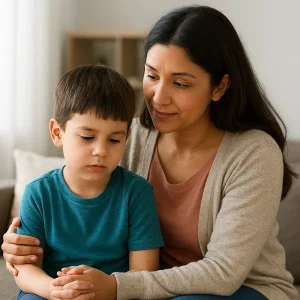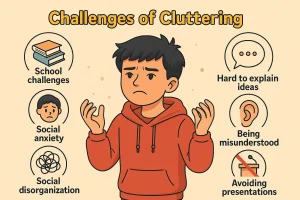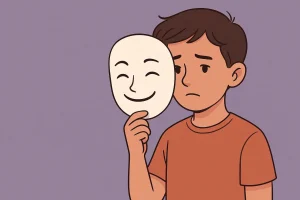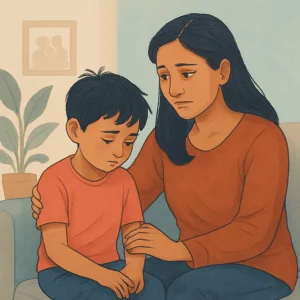Fun Games and Activities to Boost Concentration in Kids
By Wellness Hub
Last Updated: November 2, 2024
Have you ever noticed how easily kids can get distracted?
Whether it’s during homework, while listening to instructions, or even when playing with toys, staying focused can be a real challenge for them. Concentration is more than just keeping still; it’s a crucial skill that affects learning, behavior, and overall development. When kids struggle to concentrate, it can impact their ability to absorb information, follow directions, and complete tasks effectively. But here’s the good news: improving concentration doesn’t have to feel like a chore. In fact, it can be fun and engaging!
Imagine turning everyday playtime into a powerful tool for boosting your child’s focus. That’s right—fun games and activities can naturally enhance concentration skills in kids, making it easier for them to pay attention and stay engaged in whatever they’re doing. By incorporating the right kinds of activities into their routine, you’re not just helping them concentrate better; you’re also setting them up for success in school, sports, and everyday life.
Why is Concentration Important for Kids?
Concentration is like a superpower for kids—it helps them focus, learn, and thrive in all areas of their lives. Imagine trying to read a book while the TV is blaring in the background, or completing a puzzle when your mind keeps wandering. That’s what it can feel like for kids when they struggle with concentration. But when they learn how to focus, the benefits are amazing and reach far beyond just getting better grades in school.
First and foremost, good concentration skills can significantly boost academic performance. When children can focus on what they’re learning, they absorb information more effectively, follow instructions better, and complete their tasks without getting easily distracted. This not only helps them do well in subjects like math and reading but also builds a strong foundation for lifelong learning.
Beyond academics, concentration plays a big role in a child’s behavior. Kids who can concentrate tend to manage their impulses better, making them more likely to stay calm and follow through on what they start. This can lead to improved behavior both in the classroom and at home, as they’re able to listen, respond thoughtfully, and avoid acting out due to frustration or lack of focus.
Concentration also enhances problem-solving skills, which are crucial not just in school but in everyday life. When children can focus on a challenge, whether it’s figuring out a tricky puzzle or resolving a conflict with a friend, they’re more likely to come up with effective solutions. This builds their confidence and encourages them to tackle new challenges with a positive attitude.
Signs Your Child May Need Help with Concentration
It’s not uncommon for kids to get distracted now and then, but how do you know if your child might need a little extra help with their concentration? Recognizing the signs early can make a big difference in their ability to focus and succeed in various aspects of life. Here are some common signs that your child may be struggling with concentration:
- Easily Distracted: Does your child often lose focus in the middle of a task? Whether it’s during homework, chores, or even playtime, getting easily distracted by noises, movements, or their own thoughts can be a sign of concentration difficulties.
- Trouble Finishing Tasks: If your child frequently starts activities but rarely finishes them, this could be another red flag. Whether it’s a school assignment, a simple household chore, or even a game, jumping from one task to another without completing them might indicate a lack of sustained focus.
- Difficulty Following Instructions: Sometimes, kids with concentration challenges struggle to follow through on instructions, especially when those instructions involve multiple steps. If you find yourself repeating directions or notice your child misses key details, it could be due to their mind wandering.
- Restlessness and Fidgeting: Kids who have trouble concentrating may show signs of restlessness, such as constant fidgeting, getting up frequently, or struggling to stay seated. This restlessness can be their way of coping with the difficulty of maintaining focus on one thing at a time.
- Avoidance of Challenging Tasks: When concentration is a struggle, kids might avoid tasks they find difficult or boring. This could look like procrastination or a strong dislike for activities that require mental effort, like reading or solving puzzles.
Top Fun Games to Boost Concentration in Kids
Helping kids improve their concentration can be fun and easy! Here are some great games and activities that not only keep kids entertained but also help them focus better:
1. Memory Games
Memory games like matching cards, Simon Says, and classic memory card games are great for boosting concentration. These games make kids pay attention, remember patterns, and use their brains in a fun way. Repeating these activities helps strengthen their memory and focus over time.
2. Puzzles and Brain Teasers
Puzzles like jigsaw puzzles, Sudoku, and the Rubik’s Cube are excellent for teaching kids to stay focused. They help kids learn to solve problems, be patient, and stick with tasks until they finish them. Plus, completing a puzzle gives them a sense of achievement that builds their confidence.
3. Strategy Board Games
Games like Chess, Checkers, and Connect 4 are not only fun but also help kids think ahead. These games teach kids to plan their moves and focus on the game, which can improve their decision-making skills. It’s a fun way for kids to practice staying focused and thinking critically.
4. Focus-Enhancing Video Games
Not all video games are bad for kids! Educational games like Lumosity or Osmo are designed to improve focus and other thinking skills. These games mix fun with learning, making it easier for kids to pay attention. Just remember to keep screen time balanced and choose games that are suitable for their age.
5. Outdoor Activities for Concentration
Outdoor activities like scavenger hunts, obstacle courses, and nature walks are great for clearing the mind and improving concentration. Physical activity helps kids focus better and feel less stressed. Plus, being outside and active is always a fun break from indoor activities!
Games and Their Benefits
| Game/Activity | Benefit | Explanation |
|---|---|---|
| Memory Games | Improves short-term memory and focus | Memory games like matching cards or Simon Says help children remember sequences, spot patterns, and pay close attention, which strengthens their focus. |
| Puzzles and Brain Teasers | Enhances problem-solving and patience | Puzzles like jigsaw puzzles, Sudoku, and Rubik’s Cube encourage kids to think critically, solve problems step-by-step, and stick with tasks until they’re done. |
| Strategy Board Games | Develops planning and critical thinking | Games such as Chess, Checkers, and Connect 4 teach kids to plan their moves, think ahead, and consider different outcomes, which boosts strategic thinking. |
| Focus-Enhancing Video Games | Boosts cognitive skills and attention | Educational games like Lumosity and Osmo are designed to improve various cognitive abilities, including focus, memory, and problem-solving, in a fun way. |
| Outdoor Activities | Clears the mind and reduces stress | Activities like scavenger hunts, nature walks, and obstacle courses allow kids to be physically active, helping them release energy and refocus their minds. |
Creative Activities to Enhance Focus
Helping kids improve their focus can be fun with creative activities! Here are some easy and engaging ways to boost your child’s concentration through creativity.
1. Art and Craft Projects
Art and craft projects like coloring, drawing, and making simple crafts are great for helping kids focus. These activities make kids pay attention to details and stay engaged. Whether it’s coloring within the lines or putting together a craft, these tasks help kids concentrate on one thing at a time. Plus, finishing an art project gives them a sense of achievement that boosts their confidence.
2. Mindfulness and Meditation for Kids
Mindfulness and meditation can help calm kids’ minds and improve their focus. Simple exercises like deep breathing, imagining peaceful scenes, or short meditation sessions can teach kids to relax and pay attention to the moment. For example, teaching your child to take a few deep breaths when they feel distracted can help them refocus. Even a few minutes of mindfulness each day can make a big difference.
3. Music and Rhythm Games
Music and rhythm games are fun ways to boost concentration. Learning to play a musical instrument, like the piano or drums, helps kids focus on following patterns and practicing regularly. Even simple rhythm games, like clapping along to a beat, can improve listening skills and concentration. Music engages the brain in a unique way, making it easier for kids to focus on tasks.
Practical Tips for Parents to Encourage Concentration
Helping your child improve concentration doesn’t have to be complicated. With a few simple adjustments, you can create a supportive environment that encourages focus. Here are some practical tips for parents to help their kids concentrate better:
1. Set a Routine and Create a Quiet Environment
Kids thrive on routines, and having a regular schedule can make a big difference in their ability to concentrate. When kids know what to expect, it’s easier for them to settle into tasks without distractions. Try to set consistent times for activities like homework, play, meals, and bedtime. This predictability helps their brain switch gears more smoothly between tasks.
Creating a quiet environment is equally important. Find a space in your home where your child can work or play without interruptions. Keep noise and distractions to a minimum by turning off the TV, reducing background noise, and keeping toys or gadgets out of sight during focus times. A calm and organized space can help your child focus on the task at hand without getting sidetracked.
2. Use Positive Reinforcement and Rewards
Positive reinforcement can be a powerful tool for encouraging concentration. Praise your child when they focus well or complete a task, no matter how small. Simple words like “Great job staying focused!” can boost their confidence and motivate them to keep trying. Small rewards, like stickers, extra playtime, or a favorite snack, can also be effective. The key is to make your child feel good about their efforts, which in turn makes them more likely to concentrate in the future.
3. Break Tasks into Manageable Chunks
Large tasks can be overwhelming for kids, leading to frustration and loss of focus. To make things easier, break tasks into smaller, more manageable chunks. For example, if your child has a big homework assignment, help them divide it into sections and tackle one part at a time. This approach makes the task feel less daunting and allows your child to experience a sense of progress along the way. It’s much easier for kids to concentrate when they’re not feeling overwhelmed by the size of the task.
Common Challenges and How to Overcome Them
Sometimes, helping kids focus can be tough, especially when they get frustrated or lose interest quickly. Here are some simple tips to help you handle these common challenges:
1. Dealing with Frustration and Short Attention Spans
Kids can get frustrated easily, especially when things are hard or boring for them. They might find it tough to stay focused for long periods. When this happens, it’s important to be patient. Encourage your child to take short breaks when they feel restless or upset. A quick stretch, a sip of water, or a few deep breaths can help them calm down and start fresh.
Try breaking tasks into smaller, easier steps. Celebrate each small win—it helps kids feel good about their progress and keeps them motivated. Remind them that it’s okay to take it slow and that everyone needs a break sometimes.
2. Balancing Screen Time and Physical Activities
With so much time spent on screens for learning and fun, balancing screen time with physical activities is crucial. While educational games and apps can be helpful, too much screen time can make it harder for kids to focus. Set simple screen time rules, like taking a break after 30 minutes of screen use. Encourage your child to do something active, like playing outside, doing a quick exercise, or just moving around.
Physical activities help kids burn off energy, which can make it easier for them to sit down and concentrate later. A good mix of active play and quiet time can greatly improve focus and overall well-being.
Conclusion
Boosting concentration in kids can be simple and enjoyable by adding fun games and activities to their daily routines. Activities like memory games, puzzles, art projects, and mindfulness exercises can help kids focus better while having a good time. Each child is unique, so it’s important to try different activities and see what works best for your child. Start small, and be patient as you guide them toward better concentration skills.
Improving focus has long-term benefits that can help kids do better in school, feel more confident, and handle challenges more easily. By making these activities a regular part of their routine, you’re setting them up for success in many areas of life. So why not give it a try? Explore these fun ways to boost concentration and see the positive changes they can bring. For more tips and support, visit Wellness Hub for expert advice tailored to your child’s needs.
Frequently Asked Questions:
1. What are some fun games to help improve my child’s concentration?
Fun games like memory matching cards, puzzles, and strategy board games like Chess or Connect 4 can greatly help improve your child’s concentration. These activities are engaging and require focus, making them effective tools for boosting attention.
2. How can art and crafts help my child concentrate better?
Art and crafts, such as coloring and drawing, help kids focus on details and stay engaged in the task. These activities encourage patience and creativity, which are key for improving concentration over time.
3. What are easy mindfulness exercises for kids to improve focus?
Simple mindfulness exercises like deep breathing, guided imagery, and short meditation sessions can calm the mind and enhance focus. These exercises are easy to practice and can be done in just a few minutes each day.
4. How do I balance screen time with other activities to boost concentration?
To balance screen time, set clear limits and encourage breaks for physical activities like playing outside, running, or doing a quick exercise. This helps burn off energy and makes it easier for kids to concentrate later on.
5. What should I do if my child gets frustrated easily while trying to focus?
If your child gets frustrated, encourage them to take short breaks. Break tasks into smaller steps and praise their efforts, even for small achievements. This approach can help them feel less overwhelmed and more motivated to focus.
6. Why is setting a routine important for improving my child’s concentration?
A regular routine helps kids know what to expect, making it easier for them to switch between tasks without getting distracted. A quiet and organized environment also supports better concentration.
7. Can playing video games help my child focus?
Some educational video games designed to improve cognitive skills can help with focus. However, it’s important to choose age-appropriate games and limit screen time to maintain a healthy balance with other activities.
8. What are the long-term benefits of improving concentration in children?
Improving concentration can help kids perform better in school, build confidence, and handle challenges more effectively. These skills are valuable not just in academics but in everyday life, setting them up for future success.
9. How can I make concentration-boosting activities part of my child’s daily routine?
To make concentration-boosting activities a regular part of your child’s day, start by setting aside specific times for these games and exercises. Incorporate them into playtime, homework breaks, or before bedtime. Consistency is key, so try to make these activities fun and something to look forward to.
10. Are there any concentration exercises that can be done without any special equipment?
Yes, there are many concentration exercises that don’t require any special equipment. Simple activities like “Simon Says,” deep breathing exercises, clapping games, and even basic counting games can effectively boost focus and are easy to do anywhere, anytime.
About Author:
Lasya Vooturi,
Clinical Psychologist (A) & Behavioral Therapist
Lasya holds a Professional Diploma in Clinical Psychology from Amity University, where she deepened her understanding of psychological principles from March 2023 to March 2024. With over a year of dedicated experience as a Behavioral Therapist, Lasya has honed her skills in applying effective therapy techniques tailored to individual needs. Fluent in Telugu, Hindi, and English, she is adept at connecting with a diverse range of clients, ensuring comprehensive communication and understanding. Lasya’s approach is grounded in empathy and scientific rigor, making her a trusted ally in navigating mental health challenges.
Book your Free Consultation Today
Parent/Caregiver Info:
Client’s Details:
* Error Message









